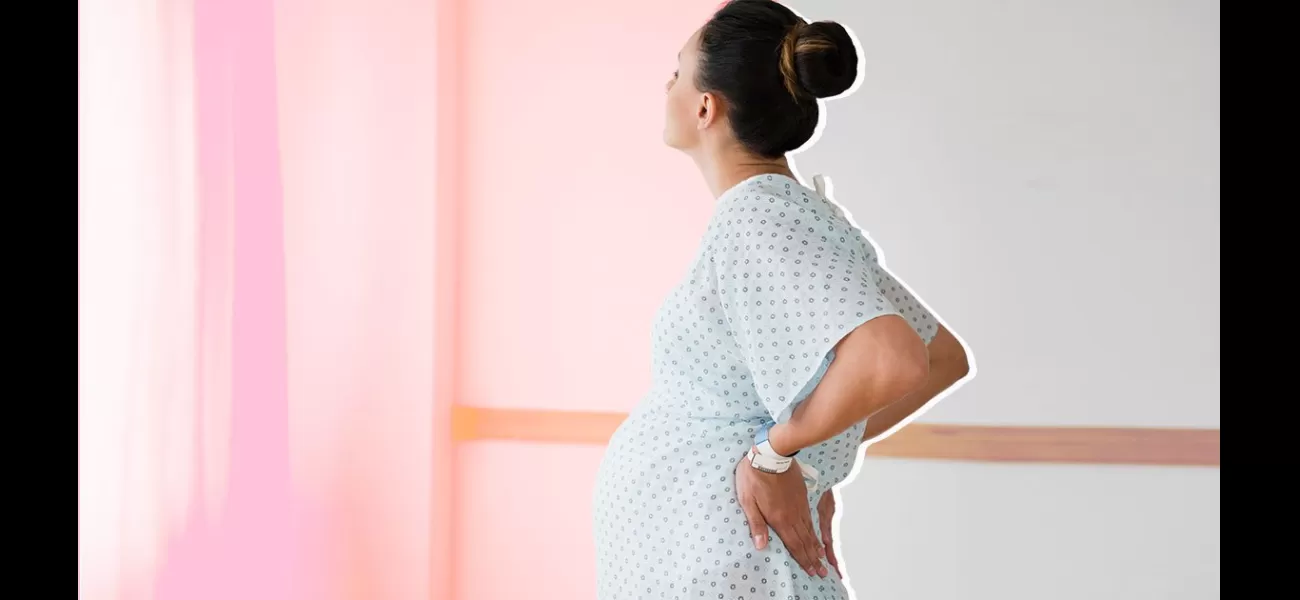Record numbers of women are pursuing fertility treatments independently, and the writer will be among them.
Not meeting the right person shouldn't stop me from having kids.
July 17th 2024.

In recent years, there has been a noticeable rise in the number of single women opting for IVF as a means of starting a family. In fact, in the last year alone, 3,548 single women underwent IVF treatment, marking an 82% increase from the previous year. This equates to 1,595 more women choosing to become single parents through fertility treatment. While heterosexual couples still make up the majority of IVF patients (90%, according to the latest data from HFEA), the surge in single women using this method to become mothers begs the question: why?
Elizabeth Morris, a 32-year-old single woman, is among the many considering fertility treatment to have a baby. "I have always envisioned kids in my future, but now that I'm in my thirties and still single, it sometimes feels like the traditional route may not be in the cards for me," she shares with Metro. "In an ideal world, I would go through this journey with a partner - someone I am in love with, who shares the same values and desire to raise a child - but I am also a realist. If push comes to shove, I wouldn't want to miss out on having kids just because I haven't found the right person."
While Elizabeth hasn't completely given up on the possibility of meeting someone, she has started exploring other options for motherhood, such as donor insemination and having her egg reserve tested. This is a sentiment shared by many single women who prioritize their careers and education, but still want children despite their relationship status.
Dr. Sami Almusawa, medical director and leading fertility consultant at Plan Your Baby, has noticed a significant increase in the number of single women seeking advice on IVF over the past three years. "I believe this is due to changing societal norms," he tells Metro. "There is now greater acceptance of single parenthood and non-traditional family structures, which has reduced the stigma surrounding single motherhood." He also notes that the rising financial independence among women has allowed them to consider the possibility of being a single parent, while increased awareness about available fertility treatments has played a role as well.
This was the case for Danielle Buttle, who, at the age of 30 and single, began to feel anxious about not finding "the one." As a financially independent business owner, she decided to spend £3,000 on IVF and successfully gave birth to her son, Robin. "It was the best decision I ever made," she shared in a previous interview. "Now I have a gorgeous baby boy and I just can't stop staring at him."
Like Danielle, Elizabeth also hasn't found someone she loves to have a baby with since breaking up with her long-term boyfriend in her late twenties. "I'm very independent and self-sufficient, so the idea of going it alone with a child isn't as daunting for me as it may be for others," she explains. She has also witnessed her friends struggle with partners who were not pulling their weight in co-parenting, so she is content with the responsibility of raising a child on her own - at least she won't be disappointed in a partner. "I don't know if it's enough, but I also feel my body craving a baby now in a way that it didn't when I was younger," she adds. "I don't feel incomplete or anything like that; I just feel ready."
In 2022, there were a staggering 52,500 patients who underwent IVF treatment in the UK - a slight increase from the 50,000 recorded in 2019. Courtney Cecil was among them, spending £37,000 at the age of 25 to become a single mother to her daughter, Daisy. This was after coming out of an 8-year relationship and losing her first baby due to Turner syndrome, a chromosomal condition that affects development. Due to her fertility issues, waiting could have made conceiving even more difficult, so she took the plunge and started IVF, giving birth to Daisy in September 2023. "It has its challenges," Courtney admits, "but I have never regretted it. I have my own baby, car, and house. I make all the decisions, as I am both mom and dad. I wouldn't have it any other way."
However, access to IVF is not as easy for single women as it is for couples. Dr. Almusawa explains that many single women are not eligible for NHS-funded fertility treatments due to restrictive criteria. In 2019, former Made In Chelsea star Ashley James spoke out against this policy, calling it unfair. "I pay my taxes like everyone else," she stated on Good Morning Britain. "The NHS is for everyone, therefore I feel like I should have the right to have IVF. I'm a single woman in my thirties. I'm not single because it's a lifestyle." It's important to consider the barriers that single women face in accessing fertility treatments and advocate for equal access for all who desire to start a family.
In recent times, there has been a significant increase in the number of women choosing to undergo IVF treatments on their own. In fact, in the past year alone, 3,548 single women have embarked on this journey, which represents an 82% rise from the previous year. This means that 1,595 more women have made the decision to become single mothers through this method of assisted fertility.
While heterosexual couples still account for the majority of IVF patients, with 90% of the total number, there has been a noticeable surge in the number of single women turning to this option to fulfill their dreams of motherhood. This has led many to wonder what could be the reason behind this trend.
One such woman is Elizabeth Morris, 32, who is currently considering fertility treatment as a way to have a baby on her own. She shares, "I have always envisioned having children in my future, but as I enter my thirties and remain single, it sometimes feels like the traditional path might not be in the cards for me." She adds, "In an ideal world, I would go through this journey with a partner - someone I love and who loves me, shares my values, and wants to raise a child in the same way as me. But I am also a realist and if it comes down to it, I wouldn't want to miss out on having a child just because I haven't found the right person yet."
While Elizabeth hasn't completely given up on the idea of meeting someone and starting a family together, she has also explored other options like donor insemination and getting a blood test to assess her egg count. This is a sentiment shared by many other single women who are prioritizing their careers and education over their love life, but still want to experience the joys of motherhood.
According to Dr. Sami Almusawa, medical director and fertility consultant at Plan Your Baby, the number of single women seeking advice on IVF treatments, like Elizabeth, has almost doubled in the past three years. He believes that this is due to changing societal norms, as there is now a greater acceptance of single parenthood and non-traditional family structures. He also points out that increased financial independence among women has allowed them to consider becoming single parents, and there is also more awareness about the available fertility treatments.
Danielle Buttle's story is a testament to this trend. When she turned 30 and was still single, she started to worry that she might never find the right partner. However, being financially independent from owning her own dance school, she made the decision to spend £3,000 on IVF and successfully gave birth to her son, Robin. Looking back, Danielle says, "It was the best decision I ever made. Now I have a beautiful baby boy and I can't stop staring at him."
Elizabeth, like Danielle, also hasn't found someone she wants to have a child with since her long-term relationship ended in her late twenties. She shares, "I am very independent and self-sufficient, so the idea of going it alone with a child doesn't seem as daunting to me as it might to others." She also mentions how she has seen her friends struggle with co-parenting with partners who weren't fully invested, and she is content with the idea of taking on the responsibility of a child on her own. "At least this way, I won't be disappointed in a partner," she adds. She also notes that she has been feeling a strong desire to have a baby now, which she didn't feel when she was younger. "I don't feel incomplete or anything like that, I just feel ready," she shares.
In the UK alone, there were 52,500 patients who underwent IVF treatment in 2022, which was a slight increase from the 50,000 recorded in 2019. Among them was Courtney Cecil, who, at the age of 25, spent £37,000 to become a single mother to her daughter, Daisy. This was after she lost her first baby due to Turner syndrome, a chromosomal condition that affects development. Due to her fertility issues, waiting could have made conceiving even more difficult, so she decided to take the plunge and start IVF. Daisy was born in September of 2023. While Courtney admits that being a single mother has its challenges, she says she has never regretted her decision. "I have my own baby, car, and house. I make all the decisions as I am both mom and dad. I wouldn't have it any other way," she shares.
However, access to IVF treatments for single women is not without its challenges. Dr. Almusawa explains that many of these women are not eligible for NHS-funded fertility treatments due to restrictive criteria. In 2019, former Made In Chelsea star Ashley James publicly spoke out against this policy, calling it unfair. She argued that as a taxpayer, she should have the right to access IVF treatments through the NHS, regardless of her relationship status. She said, "I'm a single woman in my thirties. I'm not single because it's a lifestyle."
Elizabeth Morris, a 32-year-old single woman, is among the many considering fertility treatment to have a baby. "I have always envisioned kids in my future, but now that I'm in my thirties and still single, it sometimes feels like the traditional route may not be in the cards for me," she shares with Metro. "In an ideal world, I would go through this journey with a partner - someone I am in love with, who shares the same values and desire to raise a child - but I am also a realist. If push comes to shove, I wouldn't want to miss out on having kids just because I haven't found the right person."
While Elizabeth hasn't completely given up on the possibility of meeting someone, she has started exploring other options for motherhood, such as donor insemination and having her egg reserve tested. This is a sentiment shared by many single women who prioritize their careers and education, but still want children despite their relationship status.
Dr. Sami Almusawa, medical director and leading fertility consultant at Plan Your Baby, has noticed a significant increase in the number of single women seeking advice on IVF over the past three years. "I believe this is due to changing societal norms," he tells Metro. "There is now greater acceptance of single parenthood and non-traditional family structures, which has reduced the stigma surrounding single motherhood." He also notes that the rising financial independence among women has allowed them to consider the possibility of being a single parent, while increased awareness about available fertility treatments has played a role as well.
This was the case for Danielle Buttle, who, at the age of 30 and single, began to feel anxious about not finding "the one." As a financially independent business owner, she decided to spend £3,000 on IVF and successfully gave birth to her son, Robin. "It was the best decision I ever made," she shared in a previous interview. "Now I have a gorgeous baby boy and I just can't stop staring at him."
Like Danielle, Elizabeth also hasn't found someone she loves to have a baby with since breaking up with her long-term boyfriend in her late twenties. "I'm very independent and self-sufficient, so the idea of going it alone with a child isn't as daunting for me as it may be for others," she explains. She has also witnessed her friends struggle with partners who were not pulling their weight in co-parenting, so she is content with the responsibility of raising a child on her own - at least she won't be disappointed in a partner. "I don't know if it's enough, but I also feel my body craving a baby now in a way that it didn't when I was younger," she adds. "I don't feel incomplete or anything like that; I just feel ready."
In 2022, there were a staggering 52,500 patients who underwent IVF treatment in the UK - a slight increase from the 50,000 recorded in 2019. Courtney Cecil was among them, spending £37,000 at the age of 25 to become a single mother to her daughter, Daisy. This was after coming out of an 8-year relationship and losing her first baby due to Turner syndrome, a chromosomal condition that affects development. Due to her fertility issues, waiting could have made conceiving even more difficult, so she took the plunge and started IVF, giving birth to Daisy in September 2023. "It has its challenges," Courtney admits, "but I have never regretted it. I have my own baby, car, and house. I make all the decisions, as I am both mom and dad. I wouldn't have it any other way."
However, access to IVF is not as easy for single women as it is for couples. Dr. Almusawa explains that many single women are not eligible for NHS-funded fertility treatments due to restrictive criteria. In 2019, former Made In Chelsea star Ashley James spoke out against this policy, calling it unfair. "I pay my taxes like everyone else," she stated on Good Morning Britain. "The NHS is for everyone, therefore I feel like I should have the right to have IVF. I'm a single woman in my thirties. I'm not single because it's a lifestyle." It's important to consider the barriers that single women face in accessing fertility treatments and advocate for equal access for all who desire to start a family.
In recent times, there has been a significant increase in the number of women choosing to undergo IVF treatments on their own. In fact, in the past year alone, 3,548 single women have embarked on this journey, which represents an 82% rise from the previous year. This means that 1,595 more women have made the decision to become single mothers through this method of assisted fertility.
While heterosexual couples still account for the majority of IVF patients, with 90% of the total number, there has been a noticeable surge in the number of single women turning to this option to fulfill their dreams of motherhood. This has led many to wonder what could be the reason behind this trend.
One such woman is Elizabeth Morris, 32, who is currently considering fertility treatment as a way to have a baby on her own. She shares, "I have always envisioned having children in my future, but as I enter my thirties and remain single, it sometimes feels like the traditional path might not be in the cards for me." She adds, "In an ideal world, I would go through this journey with a partner - someone I love and who loves me, shares my values, and wants to raise a child in the same way as me. But I am also a realist and if it comes down to it, I wouldn't want to miss out on having a child just because I haven't found the right person yet."
While Elizabeth hasn't completely given up on the idea of meeting someone and starting a family together, she has also explored other options like donor insemination and getting a blood test to assess her egg count. This is a sentiment shared by many other single women who are prioritizing their careers and education over their love life, but still want to experience the joys of motherhood.
According to Dr. Sami Almusawa, medical director and fertility consultant at Plan Your Baby, the number of single women seeking advice on IVF treatments, like Elizabeth, has almost doubled in the past three years. He believes that this is due to changing societal norms, as there is now a greater acceptance of single parenthood and non-traditional family structures. He also points out that increased financial independence among women has allowed them to consider becoming single parents, and there is also more awareness about the available fertility treatments.
Danielle Buttle's story is a testament to this trend. When she turned 30 and was still single, she started to worry that she might never find the right partner. However, being financially independent from owning her own dance school, she made the decision to spend £3,000 on IVF and successfully gave birth to her son, Robin. Looking back, Danielle says, "It was the best decision I ever made. Now I have a beautiful baby boy and I can't stop staring at him."
Elizabeth, like Danielle, also hasn't found someone she wants to have a child with since her long-term relationship ended in her late twenties. She shares, "I am very independent and self-sufficient, so the idea of going it alone with a child doesn't seem as daunting to me as it might to others." She also mentions how she has seen her friends struggle with co-parenting with partners who weren't fully invested, and she is content with the idea of taking on the responsibility of a child on her own. "At least this way, I won't be disappointed in a partner," she adds. She also notes that she has been feeling a strong desire to have a baby now, which she didn't feel when she was younger. "I don't feel incomplete or anything like that, I just feel ready," she shares.
In the UK alone, there were 52,500 patients who underwent IVF treatment in 2022, which was a slight increase from the 50,000 recorded in 2019. Among them was Courtney Cecil, who, at the age of 25, spent £37,000 to become a single mother to her daughter, Daisy. This was after she lost her first baby due to Turner syndrome, a chromosomal condition that affects development. Due to her fertility issues, waiting could have made conceiving even more difficult, so she decided to take the plunge and start IVF. Daisy was born in September of 2023. While Courtney admits that being a single mother has its challenges, she says she has never regretted her decision. "I have my own baby, car, and house. I make all the decisions as I am both mom and dad. I wouldn't have it any other way," she shares.
However, access to IVF treatments for single women is not without its challenges. Dr. Almusawa explains that many of these women are not eligible for NHS-funded fertility treatments due to restrictive criteria. In 2019, former Made In Chelsea star Ashley James publicly spoke out against this policy, calling it unfair. She argued that as a taxpayer, she should have the right to access IVF treatments through the NHS, regardless of her relationship status. She said, "I'm a single woman in my thirties. I'm not single because it's a lifestyle."
[This article has been trending online recently and has been generated with AI. Your feed is customized.]
[Generative AI is experimental.]
0
0
Submit Comment





